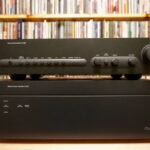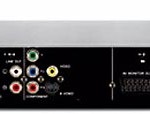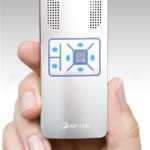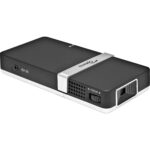Can speakers that look great sound great? Over the years, the
majority of speakers that I have heard that really sounded great all
look pretty much the same. While finishes and grills can make one
speaker look better than another, they are mostly all pretty boxy. I'm
reminded of a great line from the old movie "Crazy People," where an ad
executive ends up in a mental institution and begins to enlist the
patients to come up with ad campaigns. My favorite was one they came
up with for Volvo, and it went something like this: "Volvo. They're
Boxy, But They're Good." KEF's iQ line of speakers certainly can't be
considered boxy, but trust me, they're good.

KEF is a British company that was founded in 1961 by electrical
engineer Raymond Cooke who believed in the power of new materials and
technology combined with design ingenuity. The company still occupies
it's original site on the River Medway in the UK, pursuing these same
beliefs as a leading manufacturer of speakers for home cinema, hi-fi
and and custom installation. According to the company, KEF's
cornerstones of success are quality, honesty, dedication and innovation.

In
1988 the company introduced it's Uni-Q technology. This technology
promised to deliver well-defined stero imaging over a much wider
listening area without the need for a "sweet-spot" in the listening
room. KEF engineers accomplished this by using a material
(Neodymium/Iron/Boron, which was originally developed for the NASA
space program) that is 10 times more powerful  than a conventional
than a conventional
loudspeaker magnet, which allowed them to make a tweeter small enough
to fit within the bass unit coil at the precise acoustic center of the
cone. The current iQ line represents the fifth generation of this
technology that KEF has continued to improve on over the years.
KEF shipped me a full 5.1 surround system from their iQ line. This
line was designed with home theater and digital audio in mind, and they
are built to handle the power and dynamics typical of an Audioholic's
beefy system.
Features
The
system included a pair of iQ9 tower speakers for the front left and
right, an iQ6 center channel speaker, a pair of iQ8ds dipole rear
effect speakers, and the uniquely oval-shaped PSW3500 powered
subwoofer. The speakers are very well packaged to prevent damage during
transport. The speakers were a bit smaller than I had expected, but
this will actually help you with the WAF.
I requested the speakers in the available Apple finish, but received
it in Walnut. I must say that I was very disappointed in the Walnut
veneer. For speakers that have such a unique shape and design, I found
the Walnut to be drab and boring. The finish was not so bad looking on
the towers, but I especially disliked the way it played out on the sub.
It just looked cheap to me.
I think my distaste for walnut goes back
to my youth when the local Radio Shack was the only place I could get
to via bicycle where I could peruse gear. I am still haunted by images
of Realistic speakers surrounding me in that cheap walnut vinyl
veneer…
The flagship iQ9 tower measures just over three feet tall, and is a
gorgeous tower speaker. It is not what I would call a large speaker,
but I would soon find out it is very capable of producing large sound.
The curved cabinets are well-constructed inside and out, and look
great. They stand out from typical boxy speakers with their soft curves
and rounded rears. Each cabinet houses two 6.5" drivers for low
frequency duties, and feature the unique tweeter within a midrange
driver technology KEF calls
Uni-Q. The 3/4" aluminum dome tweeter is mounted at the acoustic center
of a bass/midrange cone. This results of this  setup are fantastic
setup are fantastic
imaging with a wide sweet spot and crisp, clean upper midrange and
highs to match the tight, distortion free bottom end that these
speakers are capable of. The Uni-Q driver is comprised of a Titanium
plated cone surrounded by Butyl rubber for improved cone excursion. The
tweeter is an aluminum cone with a fabric surround, which is capable of
high frequencies output up to 40kHz. One complaint I have with the 9's
is the grill – it is a flimsy plastic design that could be improved
upon. If you don't have kids, you might want to keep them off, as the
speakers look great without them!
The matching iQ6 three-way, bass reflex center channel speaker
combines a 5 1/4" Uni-Q array with twin 5 1/4" low frequency drivers.
As with the iQ9's, this speaker sounds much larger than it actually is.
The cabinet measures a modest 6.5" high by 20" wide, and is only 10"
deep, and has a tuned rear port. Dialogue was dispersed evenly around
my listening room and the iQ6 provided an excellent timbre-match to the
iQ9's.
Surround duties were handled by the iQ8ds dipole rear effects
speakers. These are elegant speakers that each feature two Uni-Q 5 1/4"
drivers with integrated 3/4" dome tweeters. They are timbre-matched to
the rest of the system, and share the same solid, well braced cabinet
quality as well. They ship with rubber bumpers to protect your walls
when mounted using the built-in keyhole system on the rear, which made
installation easy.
Rounding out this surround system is the elliptical PSW3500
subwoofer. Taking styling cues from the rest of the system, this
subwoofer makes a fashion statement in your room. The sub's cabinet is
oval, and looks unlike any other subwoofer I have seen. It is a closed
box design, with a 12" long-throw woofer and a 300 watt internal
amplifier. The speaker fires downward, and has four pointy egg-shaped
feet. On the front of the sub there is a display and IR receiver that
allows you to make remote control adjustments from your listening
position. This should be a required feature of subwoofers – I loved the
convenience of the included remote control for adjusting level,
frequency and phase. From across the room you can clearly see the LED
bars increase or decrease as you tweak levels, then a few seconds after
you finish the display turns off (except for a tiny glowing green LED
to signal that the sub is powered up).
On the rear you will find left and right RCA line inputs, as well as
high pass RC outputs (left and right). There is a SLOPE switch,
selectable 12 dB or 24 dB, a selectable LOW PASS/LFE switch, a GROUND
IN/OUT, and POWER AUTO/MANUAL. There is an eternal IR input jack (very
useful for custom remotes) and level control (up and down) buttons. But
my favorite was a switch that was labeled MUSIC/CINEMA. The only
explanation I could find for this was in the manual, where it stated
that the CINEMA mode "adds extra impact to movies," which I guess is
the equivalent to saying that it "goes to eleven," and we all know from
our friend Nigel Tufnel that this is indeed a good thing, right?
One
problem that I found upon turning on the sub, was a ground loop hum. I
had never experienced this with my reference Velodyne sub, nor had it
occurred in any other sub I had used with the system during reviews.
After an hour or so of troubleshooting, I found the culprit to be,
surprise, the Time Warner HD cable box/DVR. But the bigger issue was
that the KEF PSW3500 was susceptible to this when nothing else in my
system, not to mention other less expensive subs from other
manufacturers, has been. I was able to get rid of the hum by putting
one of those orange plug/adaptor things you get from the hardware store
on it – hardly an acceptable permanent solution, but it worked for my
review period. I tried flipping the GROUND IN/OUT switch on the back
(which KEF recommends for fixing a ground loop hum), tried different
electrical outlets, but nothing worked. It was a loud hum that was
audible with or without music or movies playing.
Once
it was all set up, it made for a great looking system. I am sure that
it is even better looking in one of the other finish options, which
include black, apple or maple. All speakers in the series are
magnetically shielded, and I feel safe saying that even in a small
listening room or theater, you find that the system will fit nicely,
and will most certainly draw attention. The curved towers invite
visitors to run their hands across the smooth finish in admiration.
It's the kind of design that makes people want to touch it – you can
decide if that is a good thing or a bad thing.
Listening Impressions
 Blue Man Group – The Complex DVD-Audio
Blue Man Group – The Complex DVD-Audio
My current torture disk for 5.1 systems is the DVD-Audio version of The Complex
by Blue Man Group. I was fortunate enough to see them touring this
arena rock show a couple of years ago, and it was a blast. If you are
not familiar with them, they are a performance art group, who happen to
be amazing percussionists. They create their own instruments using PVC
plumbing pipes, piano strings, and other psuedo-drum contraptions. The
result is a drum-heavy sort of rock music that is really great. This
DVD-Audio disk is one of my favorites – not only is the material great,
but the it quickly reveals weaknesses in speakers.
In the song "Your Attention" (Track 5), there is a subtle hi-hat
shift around the rear of the room that I had not noticed prior to my
listening evaluations with the KEF system. The dipole surrounds handled
the shift seamlessly, and I was never aware of where the left and right
surrounds where positioned in the room. As the hi-hat circled the room,
you could not tell where one speaker left off and the other picked up.
The middle of the song contains a bridge section followed by drum
solo breakdown, and even if you already have the volume turned up, this
section gets even louder (goes to eleven). The drums are
thunderously loud, and I measured the KEF system pushing over 110dB in
this section of the song. It is sonic nirvana for anyone who loves rock
music, and the KEF system stood tall. The sub handled the extreme
workout with aplomb.
Lyle Lovett – Road to Ensenada CD
 I am a huge Lyle Lovett fan, and one of the many things I love about him is how incredible most of his records sound. (Joshua Judges Ruth is a benchmark disc that I almost always use when evaluating speakers) One notable exception is Road to Ensenada.
I am a huge Lyle Lovett fan, and one of the many things I love about him is how incredible most of his records sound. (Joshua Judges Ruth is a benchmark disc that I almost always use when evaluating speakers) One notable exception is Road to Ensenada.
It sounds better on some systems than others, and usually helps point
out for me how much a speaker is coloring the sound of a recording.
I fired it up and went to track 6, "Private Conversation." Sure
enough, the track sounded bright and his vocal sounded thin. Lovett's
vocal should sound very rich, but I have always felt on this record
they just missed it. I'm not sure if it is the recording, the mix or
the mastering, but the warmth I usually associate with his vocal and
the music is just missing here, and the KEF iQ9's offered nothing to
"sweeten" the sound. If the sonic quality of this disc was a picture,
it would be faded. While some prefer their speakers to help with poor
recordings, I'll take authenticity any day of the week.
Dreamgirls DVD
If
you haven't seen it yet, I would recommend it for the music alone. I
liked most of the music in the movie, and found the mix to be quite
enjoyable. I especially liked the music in the first half of the movie
when Eddie Murphy's character was performing decidedly James
Brown-esque funky tunes with the girls. Loads of driving bass lines and
horn stabs that make me feel good! HEY!
In the song "Step Into The Bad Side," there is a section where radio
announcers from different stations are piped into the surrounds, and
the effect was actually startling. It was as if there were radios
placed in different spots around the room with DJ's yapping at me from
all directions, while the song was grooving along in the foreground, creating a totally immersive experience. This is why I have a home
theater – the thrill of being surrounded by huge, enveloping sound and
having a picture just as large to go with it. The KEF system rendered
the bright, funky music and rich vocals from the movie with precision,
keeping me focused on the film itself.
Conclusion
 British
British
loudspeakers have their share of fans and critics. It is likely that
you cannot change the minds of either, regardless of the product. I
thoroughly enjoyed my time with the KEF's. I found them to be very
revealing. My best sounding discs and movies sounded great and were
imaged well across a wide axis in my listening room. Material that is
not so well mixed sounded lousy – they did not "sweeten" it to my ears.
The unusually "oval" subwoofer produced thunderous bass that brought
soundtracks to life, with as much tactile bass as I wanted during
action sequences. And I loved being able to control it via infrared
remote.
As
for looks, with the right finish these speakers will draw attention (in
a good way!). The iQ9's are not as large as many flagship towers, but
they are capable of tremendous power both as a stereo pair and as the
anchors for your home theater. The iQ6 center channel packs quite a
punch considering it's size, and the iQ8ds surrounds, while not as
curvy as the others in the series, performed their duties well. The
PSW3500 sub rocked my house yet displayed very musical qualities as
well (save for the ground loop hum issue). This system is priced right,
too, at about $3500. If you are looking at full 5.1 systems, a KEF
dealer should be on your short list of places to visit.
Recommended for:
rock/country
folk/acoustic rock/bluegrass
jazz
classical
home theater
Specs:
- Impedance: 8 ohms
- Frequency Response:
- iQ9: 38Hz – 40KHz
- iQ6c: 65Hz – 40KHz
- iQ8ds: 65Hz – 40KHz
- PSW3500: 30Hz-250Hz
- Dimensions:
- iQ9: 37" H x 8.7" W x 12.9" D
- iQ6c: 6.5" H x 20.1" W x 10" D
- iQ8ds: 7.1" H x 14.2" W x 6.7" D
- PSW3500: 17.7" H x 23.6" W x 15.6" D
Reviewer:
J. Walker Clarke, Jr







